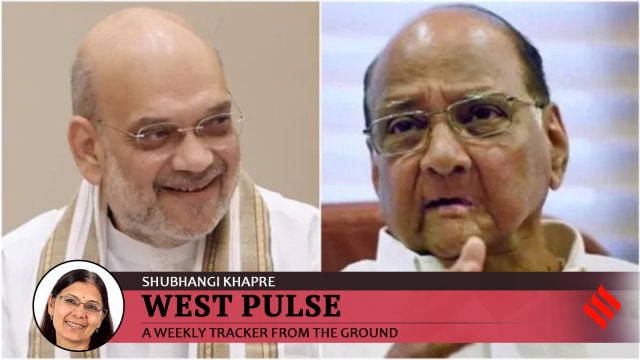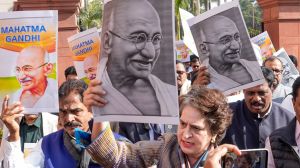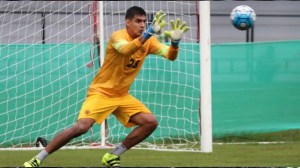Amit Shah vs Sharad Pawar flare-up: Why they are saying what they are
As the BJP leader raises NCP(SP) chief's 'betrayal', Pawar hits back with 2010 "tadipaar" reference. A look back at what happened at the time.
 Stung by Amit Shah’s attack, Sharad Pawar hit back, saying none of his predecessors as Union home ministers was a “tadipaar” like him. (Express File Photo)
Stung by Amit Shah’s attack, Sharad Pawar hit back, saying none of his predecessors as Union home ministers was a “tadipaar” like him. (Express File Photo) After a hiatus of a few months, a war of words has again erupted between senior BJP leader and Union Home Minister Amit Shah and NCP (SP) President Sharad Pawar, which may escalate in view of the coming local body elections across Maharashtra.
Addressing the Maharashtra BJP executive meeting in Shirdi last Sunday, Shah said the party’s triumph in the recent Assembly elections ended the “politics of betrayal and treachery” started by Sharad Pawar in 1978. He said the people of the state had “buried such politics 20 feet underground”.
In the polls, the incumbent Mahayuti coalition of the BJP, Eknath Shinde’s Shiv Sena and Ajit Pawar’s NCP won 230 of the 288 seats, with the BJP itself bagging 132 seats. The Opposition Maha Vikas Aghadi (MVA), comprising the Congress, NCP(SP) and Uddhav Thackeray-led Shiv Sena (UBT), was routed, with just 46 seats.
Stung by Shah’s attack, Sharad Pawar hit back Tuesday, saying none of his predecessors as Union home ministers was a “tadipaar” like him. “The dignity of the Home Minister’s post should be maintained. Till now, many legendary leaders have held the Home Ministry. But none of them were externed from their state. These were leaders who made a major contribution to the country during their tenure as Home Minister,” Pawar said.
He also asserted that he was the chief minister in 1978 and that Jana Sangh stalwarts like Uttamrao Patil and Hashu Advani were members of his Cabinet in their coalition government. The Jan Sangh was the BJP’s forerunner.
Pawar play in 1978
In 1978, Sharad Pawar broke away from the Congress (U) led by his mentor Yashwantrao Chavan, and joined hands with the Janata Party to form the Progressive Democratic Front (PDF) government. Pawar became the chief minister at the age of 38.
The PDF ministry also had some Jana Sangh leaders like Uttamrao Patil as the Deputy CM, holding the Home portfolio, and Hashu Advani as the Urban Development Minister. The PDF government lasted for 18 months.
The Jana Sangh was part of the Janata Party alliance which was formed as a non-Congress front to oppose the Emergency imposed by then Prime Minister Indira Gandhi. In the 1977 Lok Sabha elections, Gandhi was ousted from power with the Congress losing to the Janata Party.
The then Congress chief minister in Maharashtra, Shankarrao Chavan, resigned, taking responsibility for the party’s poor performance in the state. He was replaced by Congress leader Vasantdada Patil as the chief minister. Within a year, the Congress split into Yashwantrao Chavan’s Congress (U) and the Congress (I), with Pawar joining the former.
The Congress (U) and the Congress (I) fought separately in the 1978 state polls, which threw up a hung Assembly, with the Janata Party emerging as the single largest party. Both the Congress factions joined hands to form a government under CM Vasantdada Patil, in which Pawar was inducted as the Industry and Labour Minister. But soon afterwards, Pawar led a group of 40 MLAs to walk out of the Congress (U) and form the PDF government.
After the Indira-led Congress stormed back to power after clinching the Lok Sabha polls in early 1980, it dismissed the PDF government. In the ensuing Maharashtra Assembly polls, the Congress emerged as the victor with A R Antulay taking over as the chief minister. Pawar remained among the Opposition ranks and became the president of the Congress (Socialist). The Congress again won the 1985 Assembly polls, following which Pawar became the Leader of the Opposition.
In 1987, Pawar returned to the Congress party, arguing that he had done it to counter the rise of the Shiv Sena.
The ‘externment’
In his counter-attack, Pawar made a reference to Shah’s two-year externment from Gujarat in 2010 in connection with the Sohrabuddin Sheikh fake encounter case, in which he was later discharged.
Referring to Shah’s targeting of Uddhav Thackeray, Pawar said: “When this gentleman (Amit Shah after he was externed) could not stay in Gujarat, he came to Mumbai. He went to Balasaheb Thackeray’s home and requested his cooperation. Uddhav Thackeray will have more information about this. Unfortunately, these examples are enough to show how low can one stoop. I think Amit Shah’s statements will not be taken into account even by his party.”
As the then Gujarat home minister, Shah was accused of “orchestrating” extra-judicial killings of Sohrabuddin Sheikh, his wife Kauser Bi and his criminal associate Tulsiram Prajapati in police encounters.
In 2010, Shah was arrested by the CBI in the case. He was given bail after three months in jail but was barred from entering Gujarat for two years. In 2012, the Supreme Court allowed him to return to Gujarat, and he went on to win the Assembly polls from the Naranpura seat. In 2014, he was cleared in the case by a special CBI court due to lack of evidence.
Hitting out at Pawar, BJP national general secretary Vinod Tawde said, “A senior leader like Pawar should learn to take criticism sportingly. He should know that Shah was tadipaar (externed) following court order to ensure free and fair trial. He was not charged for any dacoity or crime. The Supreme Court has absolved him of all charges.”
Last year, there had been several instances of Shah and Pawar trading allegations amid the Lok Sabha polls and the subsequent Assembly elections.
Addressing a BJP conclave at Pune on July 21 last year, Shah called Pawar the “godfather of corruption” who, he alleged, institutionalised graft. Later, Pawar fired the “externment” salvo at Shah.
Why now?
However, the question doing the rounds in state political circles is why Shah has now stepped up attack on Pawar just weeks after the Assembly polls.
Some political observers say Shah’s move reflected the BJP’s continuing bid to establish its supremacy in state politics. They point out that after winning the Assembly polls the BJP is now looking to clinch the local body elections. “Parliament to local bodies, it should be BJP all the way. This was the message that emerged from the party’s Shirdi conclave,” said an observer.
On his part, Pawar, 84, is grappling with the formidable task of rebuilding his party, which was split by his nephew Ajit in July 2023. In the Lok Sabha polls, the NCP(SP) had sprung a surprise by winning eight of the 10 seats it contested. In the Assembly elections, however, the party suffered a blow, getting just 10 seats out of the 90 it contested.
By joining issue with Shah, Pawar may be sending a signal that he would not be on the backfoot despite such electoral setbacks.
- 01
- 02
- 03
- 04
- 05






























